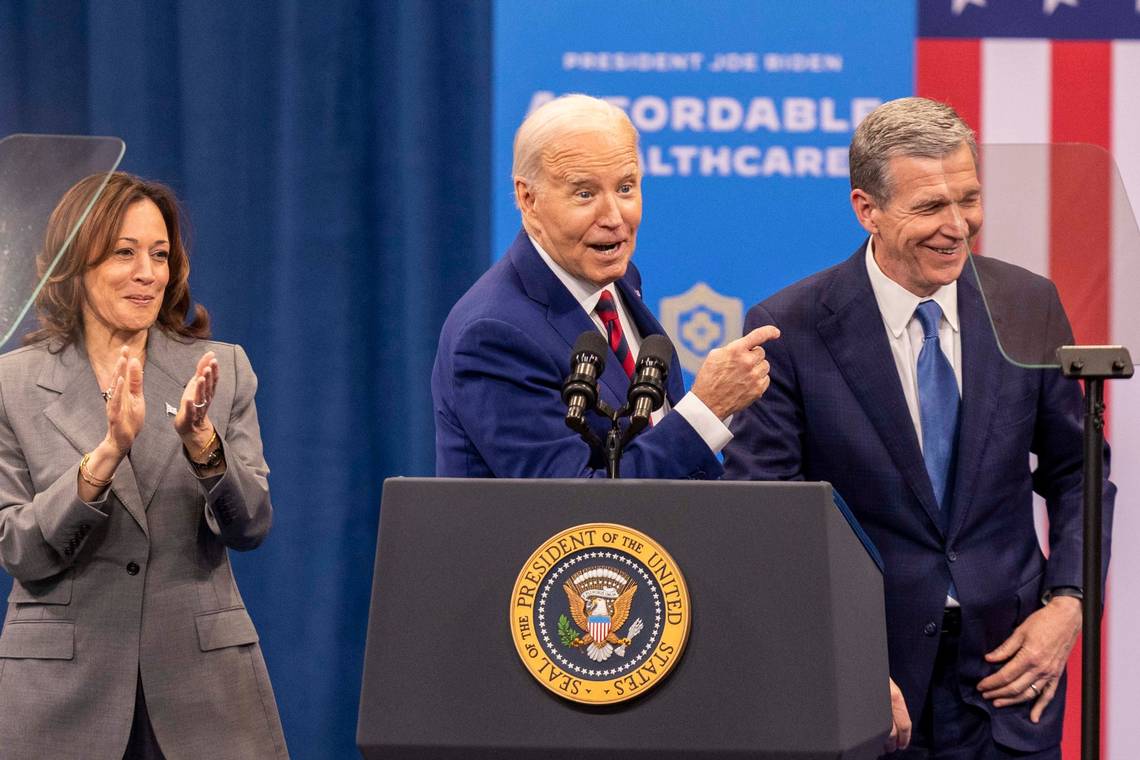The campaign is touting its early investment in the state, something state and local Democrats say they’ve lacked in previous election cycles.
While party leaders have long seen an opening to turn North Carolina blue, a Democratic presidential candidate hasn’t won the state since 2008, when Barack Obama defeated John McCain by less than half a percentage point. The last Democrat to win the state before that was Jimmy Carter in 1976. Recent polls also show former President Donald Trump leading Biden in the state ahead of November’s general election. But, Democrats note, Trump posted his slimmest margin of victory in any state in North Carolina in 2020.

That’s why they’ve homed in on Mecklenburg County, the state’s second largest in population and one that’s reliably blue, as a linchpin for success. The county’s reliability for Democrats is marred by the fact that it regularly underperforms in turning out voters.
“This is the county where this election will be won,” Mecklenburg Democrats chairman Drew Kromer told supporters at the opening of a Biden campaign field office in Charlotte last week, an event headlined by Vice President Kamala Harris.
There are some good signs for Democrats, multiple analysts say, but whether the campaign can address Charlotte’s dismal voter turnout remains to be seen.
And, they said, voters should expect both candidates to lean into their strengths as they battle for a key swing state.
Democrats’ early investment in Mecklenburg, NC
Harris’ latest visit to Charlotte — her third since June and second in as many weeks to North Carolina — marked the opening of 10 campaign field offices across the state.
“Elections matter,” Harris told the crowd at the Mecklenburg Democrats’ headquarters in uptown. “Organizing matters. Showing up matters. Remembering the strength and power of our voice matters.”
The field offices, where organizers put together on-the-ground campaign work to connect with voters, are part of a coordinated effort to staff up in North Carolina, and staff up early, according to the campaign.
“The Biden-Harris campaign is investing and organizing early to build a coalition that meets voters where they are and can win in November, including in Mecklenburg County which will be key to earning a victory for President Biden and Vice President Harris,” said Dory MacMillan, the campaign’s North Carolina communications director.
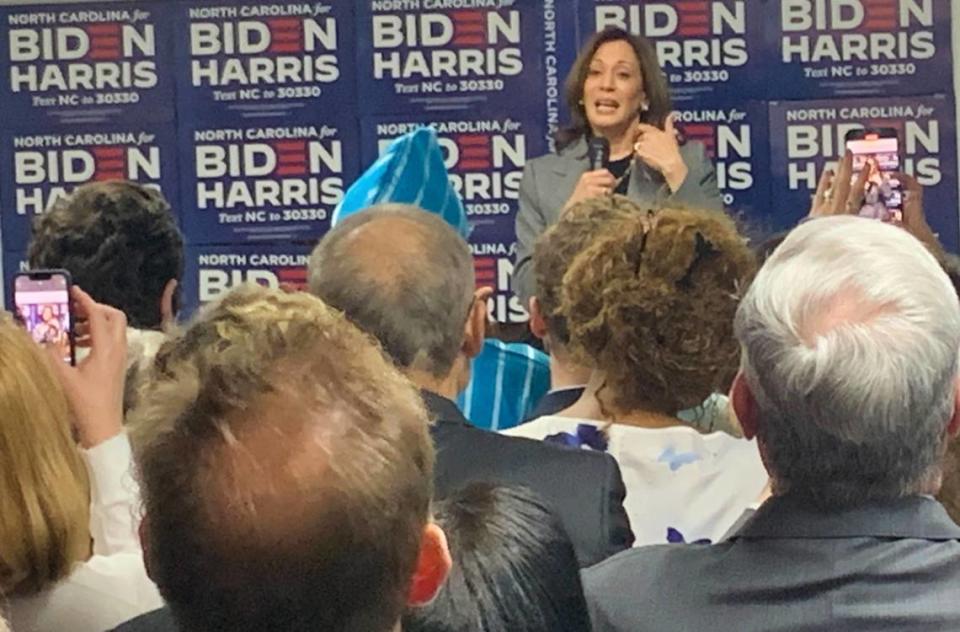

State party chairwoman Anderson Clayton told The Charlotte Observer she’s pleased to see the campaign getting a jump start in North Carolina, something that hasn’t always been the case in other recent presidential campaigns.
“I think it shows the commitment to North Carolina, the excitedness for being able to really put the boots on the ground that we need here right now this year versus what we saw in 2020,” she said. “I think they got started later on the ground than what we would have wanted them to (in 2020). And so the early investment is good, and it’s exactly what we need to see to head into this year, I think, really strong.”
Kromer said he also feels that the Biden campaign is making “necessary investments” to put the state in play.
“They’ve been making the visits, they’ve hired the staff,” he said. “They’re growing this operation.”
Both of Harris’ 2024 trips to Charlotte have also included grant announcements, including $20 billion for clean energy projects during her latest visit and $285 million for mental health services in schools in January.
That’s no coincidence, Chris Cooper, a Western Carolina University political science professor, said.
“Harris is engaging in the time-tested tradition of credit-claiming — the attempt to garner electoral support by highlighting projects that benefit a certain area. Harris is not a political novice — she knows how to win elections and how to highlight issues that will help her and her team along that path,” he said.
Cooper said the Biden campaign’s investment in field offices “is reminiscent of the strategy that Obama used in 2008.”
“Obama tended to put a lot of resources into field offices, with the idea that face-to-face campaigning and boots on the ground are more likely to win an election than air wars,” he said.
The Biden campaign is investing in advertising, too, including a $25 million, 16-week ad buy that includes North Carolina.
Cooper said he takes the campaign’s recent moves as a sign the Biden camp thinks it has a legitimate chance of winning North Carolina, and that they’re not as confident they can hold onto another southern swing state: Georgia.
“I think what it shows is that North Carolina is very much up for grabs. It’s a competitive state,” he said.
Trump campaign in NC
Asked about the Biden campaign’s investments in North Carolina, the Republican National Committee pointed to polling data that show Trump leading and the former president’s strong performances in Republican primaries.
“With an operation fueled by hundreds of thousands of small-dollar donors and energized supporters, and without sharing our strategy with Democrats through the media, we have the message, the operation and the money to propel President Trump to victory on November 5,” said Chris LaCivita, Trump campaign senior advisor and RNC chief of staff.
The RNC’s statement did not directly address questions from an Observer reporter about the campaign’s plans in North Carolina, such as future events, advertising campaigns or field office openings.
But the lack of specifics isn’t a sign that the former president is conceding North Carolina, Cooper said, noting that Trump held a rally in Greensboro ahead of the state’s primary and helped propel the former chair of the state party and his daughter-in-law, a North Carolina native, into leadership roles at the RNC.
“I think in his own way, Trump is also signaling the importance of North Carolina,” he said.
Cooper added it’s logical that Trump’s campaign would be less focused on infrastructure, because “he does not run a field office heavy campaign” and instead focuses more on rallies, some advertising and “the celebrity that is Donald Trump.”
“I think the difference is really one of strategy … I think Trump thinks he needs to do different things to win North Carolina,” he said.
Could ‘reverse coattails’ help Biden in NC?
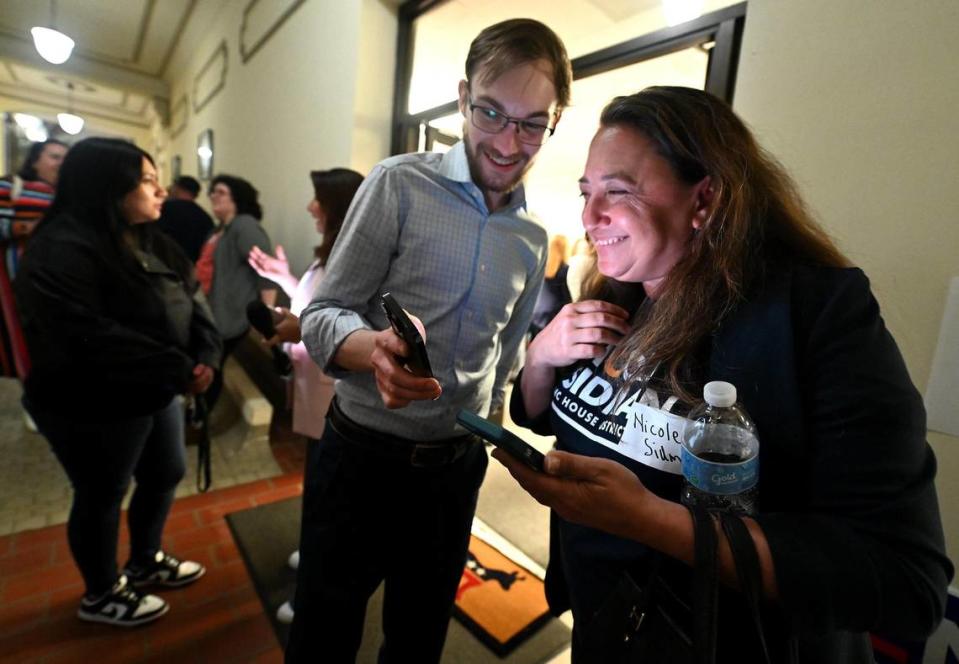

Clayton said it will be critical for Democrats to generate excitement ahead of the election, especially among younger voters, like Obama and Carter did when they won the state.
“I think both of them had an energy about their campaigns that really drew in young people, drew in a coalition of voters that needed to take the state,” she said. “And for us this year, that’s something that we’ve got to do on the ground, with getting out into college campuses, showing people that not only is the top of the ticket on your ballot this year, but also looking down ballot.”
Those down-ballot races will be a key focus for the state party, Clayton added, with the hope that excitement there flows up to Biden the same way strong support for a presidential candidate can lift state and local candidates.
“I really do believe in reverse coattails,” she said.
Charlotte-based political strategist Bryan Holladay said that could be a useful strategy in a race where neither major party presidential candidate is especially popular. Both Biden and Trump are consistently under water in their favorability ratings.
“How do you enthuse and increase voter turnout when people aren’t excited to vote for your candidate? That’s the challenge that they have,” he said of the campaigns.
A slate of Democratic statewide and local candidates with ties to Mecklenburg County — including attorney general candidate Jeff Jackson, labor commissioner candidate Braxton Winston and lieutenant governor candidate Rachel Hunt — could prove especially useful on that front, Holladay noted. There’s also Nicole Sidman’s challenge to controversial Republican state Rep. Tricia Cotham in southeast Mecklenburg, one of the state and the country’s most hotly contested legislative races.
“These are all people running statewide that appeal to different segments inside the base and can help get people to come out,” he said.
Can Democrats solve Mecklenburg’s turnout problem?
Getting people to the polls is what matters, Cooper said.
“They need to increase voter turnout in urban areas … It’s no secret that Mecklenburg County turnout has been less than enviable the last few cycles. Democrats are going to need to stop the trend,” he said.
Turnout in Mecklenburg trailed North Carolina as a whole in the 2020 presidential election by a margin of 71.9% to 75.4%, according to data from the State Board of Elections. About 44.4% of Mecklenburg County voters participated in the 2022 midterm election, when Democrats were hoping to flip a U.S. Senate seat. That was below North Carolina’s statewide voter turnout of 50.5%, and trailed other Charlotte-area counties and Democratic-leaning metro areas in the state, such as the Raleigh-Durham area.
Cooper said the Biden campaign would do well to look to Democratic Gov. Roy Cooper (no relation), who has outperformed other Democrats in more rural, Republican counties.
“They’re not going to win rural counties. There’s no question,” he said of the Biden-Harris ticket. “But can they lose rural counties by a little bit less than they have in the last few cycles? If so, then we may see Joe Biden taking North Carolina.”
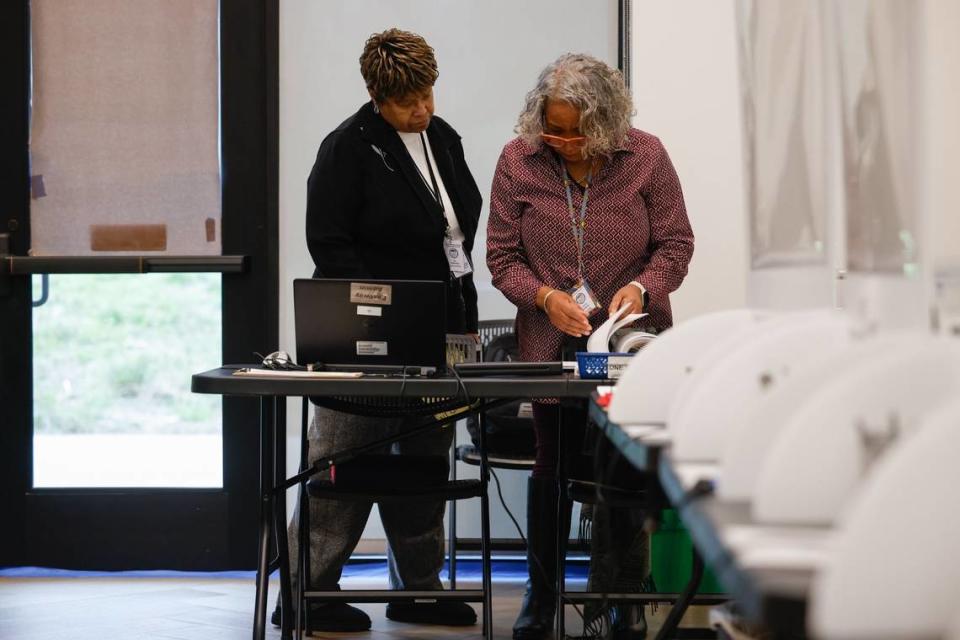

The same applies to the exurban communities around Charlotte, Cooper added.
“In a state this close, in a state this competitive, every county matters … Every vote counts,” he said.
Kromer said turnout is top-of-mind for him, and he has a specific goal in mind: increasing turnout by 20,000 voters in Mecklenburg County. State data show 569,499 people voted in Mecklenburg County in the last presidential election. With those numbers, Charlotte could do for Democrats what Fulton County, Georgia, and Maricopa County, Arizona, have done in past elections, he predicted. Both those counties, the most populous in their respective swing states, were vital to Biden’s Electoral College victory in 2020.
“If we can get on par with some of the other large counties in the state, we become North Carolina’s Fulton County,” Kromer said. “This is the county where we will decide the election.”
Mecklenburg’s turnout history
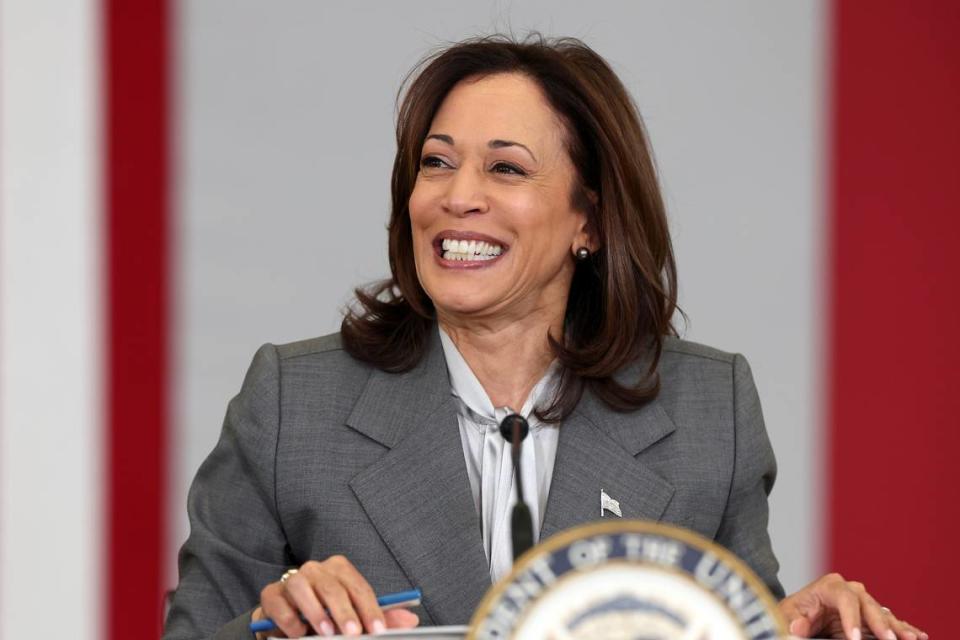

Relatively low turnout in Mecklenburg raised questions when Democratic Senate candidate Cheri Beasley lost to Republican Ted Budd in the 2022 race to succeed outgoing U.S. Sen. Richard Burr. Polls showed a relatively close race, and the outcome was expected to help decide which party would have majority control in the U.S. Senate.
“There were still over 400,000 votes left on the table …,” local Democratic strategist Annetta Watkins-Foard told the Observer after that race. “Everybody has to be asking themselves today: How do we get 400,000 additional people to just go and vote?”
Mecklenburg’s turnout numbers “certainly depressed the Democratic vote totals” in 2022, UNC Charlotte political science professor Eric Heberlig said at the time.
“Looking at the percentages, Democrats got the percentages of votes that traditionally would help them win statewide from Mecklenburg County, ‘‘ he said. “But part of the reason that the Democratic margins were wafer thin was if the turnout was a little lower.”
It’s important for Democrats to keep in mind that the counties surrounding Fulton in Georgia, home of Atlanta, are bluer than the counties around Charlotte when weighing the impact of turnout in Mecklenburg, Democratic campaign consultant Dan McCorkle told the Observer in 2022.
“She lost badly all around Mecklenburg County,” he said of Beasley. “People try to compare us to Georgia, but they cannot because Georgia has DeKalb, Gwinnett, all these counties around Atlanta that are Democratic. All the counties around Mecklenburg are staunchly red counties.”
In our CLT Politics newsletter, we offer exclusive insight into Charlotte-region politics sent to your inbox on Thursdays. Subscribe for free. Story idea? mramsey@charlotteobserver.com.
